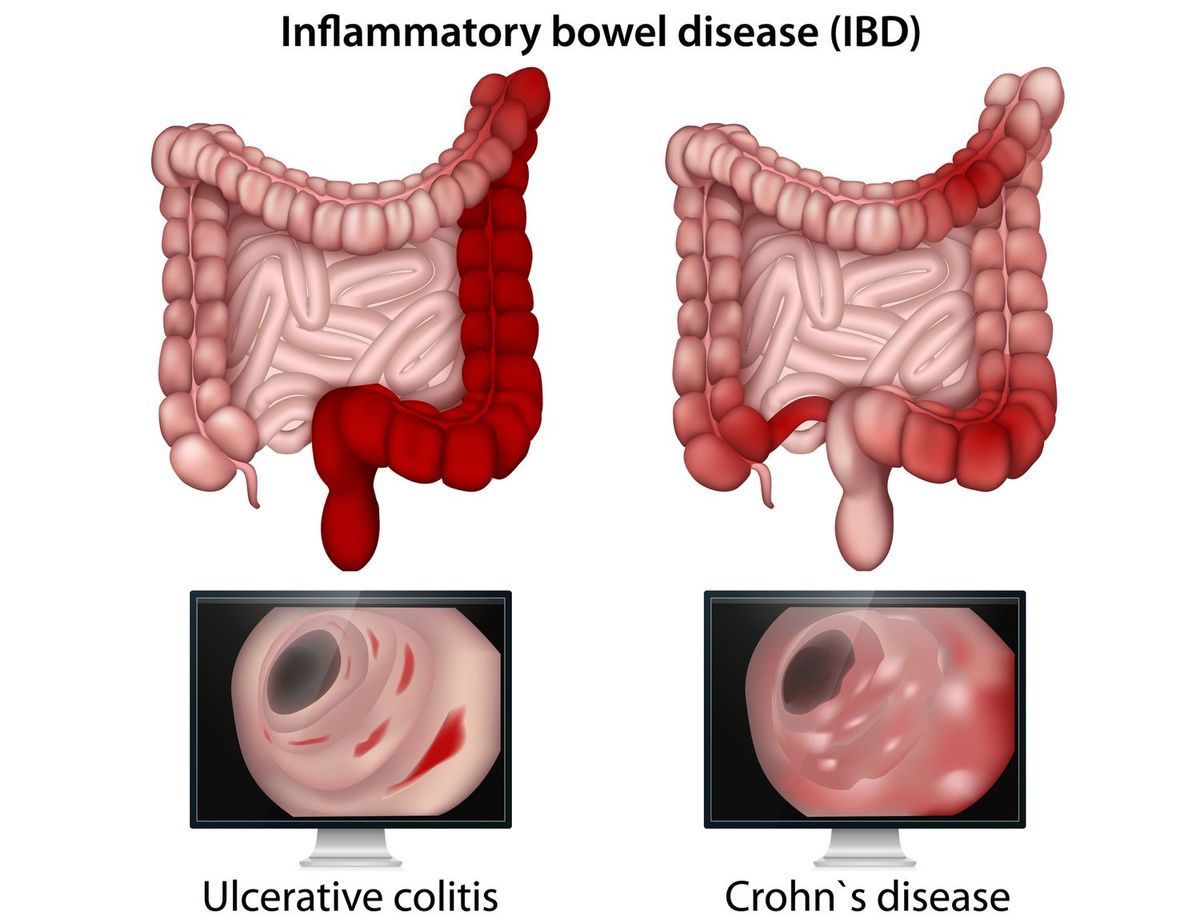Inflammatory Bowel Disease (Ulcerative colitis)
Navigating IBD: Uncover insights into Inflammatory Bowel Disease (Ulcerative Colitis). From symptoms to management, explore the journey of those affected by this condition and find support for a balanced and informed approach to health. 🩸💙

Inflammatory Bowel Disease
The inflammatory bowel diseases are Crohn’s disease and chronic inflammation of the colon (Ulcerative Colitis). Both run a mostly relapsing fever, a proliferation in the percentage of white blood cells (leukocytosis) and anemia type of vitamin B12 deficiency anemia (pernicious anemia), and iron deficiency anemia.
In Crohn’s disease, the inflammation can all parts of the digestive tract concerned, ie by mouth via the esophagus and stomach to the anus. However, most commonly it attacks the transition area from the small intestine to the large intestine. It completely healthy sections can be between two inflamed portions of the digestive tract. This fact also leads to the designation of regional enteritis.
Inflammatory Bowel Disease (Ulcerative colitis) Symptoms
Typical symptoms are recurrent diarrhea, which may be accompanied by cramping pains, especially in the lower right abdomen. A common misdiagnosis is this suspicion of appendicitis. The pain can be very severe and sudden or permanently increase and increase in intensity. Blood or mucus in the stool is common. Many patients show a weight loss as a result of protein loss through the intestines to feel tired, chipped, and have no appetite. Often it also leads to impaired absorption of vitamins and other nutrients from the intestine.
Therefore, the patients suffer occasionally from vitamin and mineral deficiencies. Other ailments such as night blindness due to vitamin A deficiency, bone disorders caused by vitamin D deficiency, skin, and mucous membrane changes due to vitamin B deficiency. More problems increased bleeding after vitamin K deficiency, muscle atrophy due to protein deficiency, physical weakness due to potassium deficiency, and spasmodic muscle disorders (eg, calf cramps) due to calcium and magnesium deficiency.
Many patients are suffering from other inflammatory diseases of the skin, eyes, joints, kidneys, vertebrae, liver, and urinary tract.
The majority of those affected occurs after long-term disease complications such as fistulas (spontaneous connections between a hollow organ and the body surface as an outer fistula or another hollow organ as an internal fistula), abscesses, glue conglomerate tumor (inflamed bowel loops together), or bowel obstruction. Often these sequelae require surgery.
Ulcerative colitis Crohn’s disease is probably very similar. However, it is limited to the colon. The disease starts at the rectum and spreads from there increasingly over the large intestine. Ulcerative colitis usually begins between 20 and 40 years. Typical symptoms include diarrhea with mucus and blood in and abdominal pain, especially before defecation called tenesmus. In severe cases, 20 diarrhea and more per day are possible. Many patients, after using the toilet, feel incomplete bowel evacuation. About half of those affected give pain, particularly in the left lower abdomen. Rarely does the patient suffer also from constipation.
Complications occur in five to seven percent of patients. Such is the toxic megacolon (massive expansion of the intestine due to a wall weakness and a gas accumulation) with the risk of bowel perforation and massive intestinal bleeding. After many years of history, the risk of developing colon cancer increased.
Rare complications of inflammatory bowel disease can also occur outside of the intestine. These include arthritis, eye inflammation, inflammation of the biliary tract (common in men), and skin lesions (erythema nodosum).
The precise distinction between the two chronic inflammatory bowel diseases often not possible at the beginning of the disease. For similar the disease in clinical picture and examination findings. For an accurate diagnosis, a colonoscopy, with suspected Crohn’s disease, a gastroscopy required. Samples were taken from the inflamed areas and examine histological under the microscope. In many cases, then be typical findings to the accurate diagnosis of the nature of the disease.
Time When Medical Evaluation Required?
Patients who suffer from persistent diarrhea or blood in the stool should be noted, and seek medical attention. Even stubborn belly pain should be clarified by a doctor. The same is true for painful tenesmus with or without fever. A feeling of incomplete bowel evacuation. Such symptoms may be signs of malignant tumors and require an accurate diagnosis.
Diarrhea and abdominal pain are other symptoms such as weight loss without dieting. Physical weakness also recommends an urgent medical evaluation. To stop Diarrhea, use natural ayurvedic home remedies treatment.
Do you suffer already from a chronic inflammatory bowel disease? The treating physician should be consulted whenever a change in the nature and severity of the symptoms. In particular, this inflammation of the eyes, skin, joints, vertebrae, biliary tract, liver and kidney, and urinary tract is observed.



